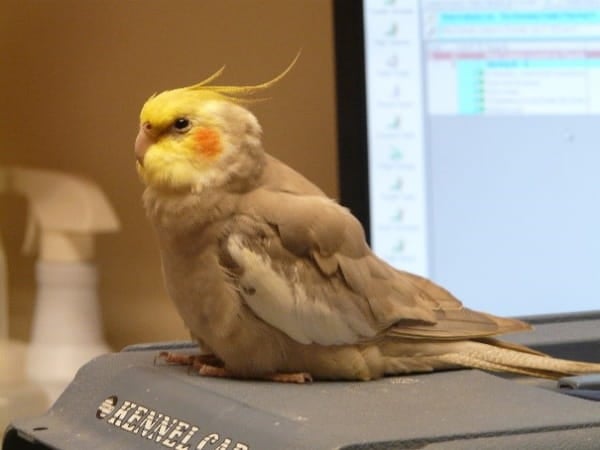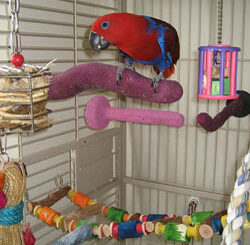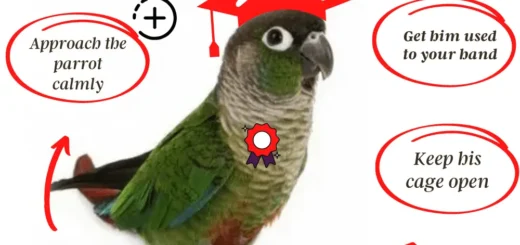Common Bird Health Issues: Recognizing Symptoms And Seeking Treatment
In “Common Bird Health Issues: Recognizing Symptoms And Seeking Treatment,” you will discover a comprehensive guide to identifying common health problems that can affect our feathered friends. This article provides valuable insights into recognizing symptoms of bird illnesses and offers practical tips on how to seek appropriate treatment. By understanding and addressing these health concerns proactively, you can ensure the well-being and longevity of your cherished avian companions.
Click here to check out How To Build An Aviary!
1. Respiratory Issues
1.1 Upper Respiratory Infections
Birds can suffer from various respiratory infections, with some of the most common being upper respiratory infections. These infections typically affect the nasal passages, throat, and sinuses of birds. The symptoms of upper respiratory infections in birds include sneezing, nasal discharge, wheezing, and difficulty breathing. If you notice these symptoms in your bird, it is important to seek veterinary care as soon as possible to prevent the infection from spreading further.
1.2 Tracheal and Air Sac Infections
Tracheal and air sac infections are another common respiratory issue that birds can experience. These infections affect the trachea, which is the tube that connects the mouth to the lungs, and the air sacs, which are responsible for storing and distributing air throughout the bird’s respiratory system. Signs of tracheal and air sac infections include difficulty breathing, coughing, wheezing, and decreased activity levels. Prompt veterinary attention is crucial to treat these infections and prevent complications.
1.3 Aspergillosis
Aspergillosis is a fungal infection that commonly affects the respiratory system of birds. It is caused by inhaling spores of the fungus Aspergillus. Birds with aspergillosis may exhibit symptoms such as difficulty breathing, coughing, sneezing, weight loss, and changes in behavior. This fungal infection can be serious and even life-threatening if left untreated, so it is essential to consult a veterinarian who can provide appropriate antifungal treatment.
1.4 Pneumonia
Pneumonia can also be a respiratory issue that affects birds. It occurs when the air sacs and lungs become inflamed due to an infection, usually bacterial or viral. Birds with pneumonia may display symptoms such as labored breathing, coughing, nasal discharge, lethargy, and loss of appetite. Veterinary intervention is crucial to diagnose the underlying cause of pneumonia and prescribe suitable treatment, which may include antibiotics or antiviral medications.
1.5 Respiratory Parasites
Respiratory parasites can pose a significant threat to the health of birds. Common respiratory parasites in birds include mites, lice, and other external parasites. These parasites can infest the respiratory system, leading to symptoms such as wheezing, coughing, sneezing, and nasal discharge. If you suspect that your bird has respiratory parasites, it is essential to consult a veterinarian who can recommend appropriate treatments, such as antimicrobial medications or insecticides.
2. Gastrointestinal Issues
2.1 Diarrhea
Diarrhea is a common gastrointestinal issue in birds and can be caused by various factors, including dietary changes, bacterial or viral infections, parasitic infestations, or even stress. It is important to monitor your bird’s droppings regularly to identify any changes in consistency or color that may indicate the presence of diarrhea. Diarrhea can lead to dehydration and nutritional deficiencies if left untreated, so it is crucial to seek veterinary advice to determine the underlying cause and provide appropriate treatment.
2.2 Constipation
On the other end of the spectrum, constipation can also occur in birds. It refers to difficulty or infrequent bowel movements. Birds with constipation may strain while attempting to defecate, have dry or hard droppings, or show signs of abdominal discomfort. In some cases, constipation can be a result of an underlying health issue, such as an obstruction in the digestive system. If your bird is experiencing constipation, it is best to consult a veterinarian to identify the cause and prevent potential complications.
2.3 Crop Stasis
Crop stasis, also known as sour crop, is a condition that affects the crop, which is a part of the bird’s digestive system responsible for storing and moistening food. It occurs when the crop becomes impacted or fails to empty properly. Birds with crop stasis may exhibit symptoms such as regurgitation, foul-smelling breath, weight loss, and a distended crop. It is important to seek veterinary attention promptly to address crop stasis, as it can lead to more severe complications if left untreated.
2.4 Proventricular Dilatation Disease
Proventricular Dilatation Disease (PDD) is a viral disease that affects the gastrointestinal system of birds. It primarily affects the nerves in the proventriculus, a glandular organ responsible for the initial breakdown of food. Birds with PDD may exhibit symptoms such as regurgitation, weight loss, vomiting, and abnormal droppings. PDD is a progressive disease with no known cure, so it is essential to consult a veterinarian who can offer supportive care to manage the symptoms and enhance the bird’s quality of life.
2.5 Megabacteria Infection
Megabacteria infection, also known as avian gastric yeast infection, is caused by an opportunistic fungal organism called Macrorhabdus ornithogaster. This infection affects the gastrointestinal system of birds and can lead to weight loss, poor appetite, regurgitation, and an overall decline in health. Megabacteria infection can be challenging to diagnose and treat, so it is important to consult a veterinarian specialized in avian medicine to determine the appropriate course of action.
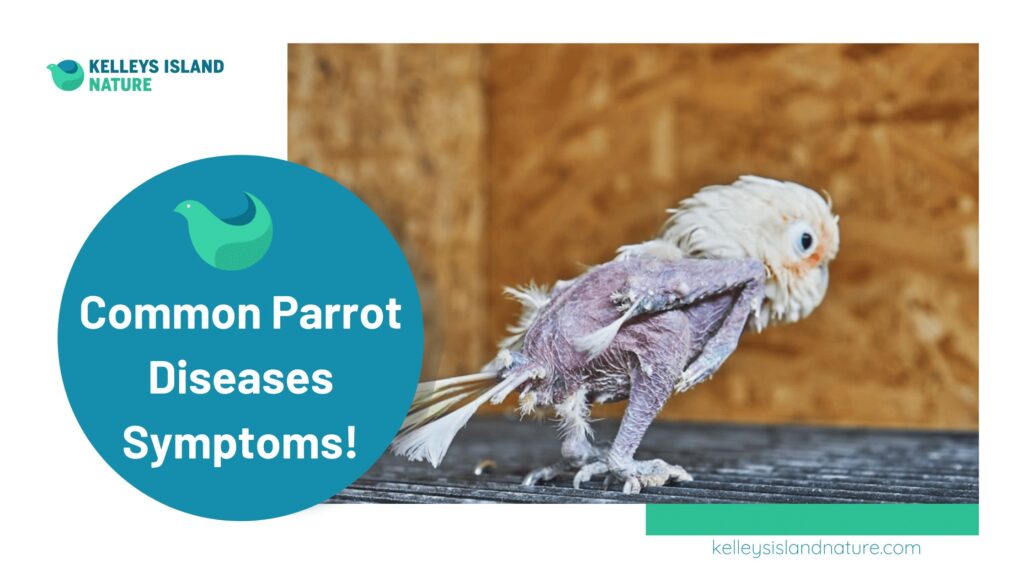
This image is property of kelleysislandnature.com.
Click here to check out How To Build An Aviary!
3. Feather and Skin Problems
3.1 Feather Plucking
Feather plucking, also known as feather picking or self-mutilation, is a behavioral issue where birds excessively groom, chew, or remove their own feathers. Feather plucking can have various underlying causes, including stress, boredom, nutritional deficiencies, skin infections, or hormonal imbalances. If you notice your bird engaging in feather plucking behavior, it is crucial to consult a veterinarian to determine the root cause and develop an appropriate management plan.
3.2 Feather Mites
Feather mites are microscopic parasites that infest the feathers and skin of birds. Infestation can lead to feather damage, inflammation, itching, and feather loss. It is vital to consult a veterinarian who can recommend treatment options to eliminate the mites and alleviate your bird’s discomfort. Additionally, proper husbandry practices and regular inspections of your bird’s feathers can help prevent feather mite infestations.
3.3 Skin Infections
Skin infections in birds can occur due to bacteria, fungi, or parasites. Birds with skin infections may exhibit symptoms such as redness, swelling, abnormal feather growth, itching, or lesions on the skin. Timely veterinary care is essential to diagnose the specific infectious agent and administer appropriate treatment. Preventive measures, such as maintaining clean and sanitary living conditions, can help minimize the risk of skin infections in birds.
3.4 Feather Cysts
Feather cysts are fluid-filled sacs that form under the skin and are commonly found around feather follicles. These cysts can develop in response to injury, infection, or hormonal imbalances. Feather cysts may appear as firm or soft masses underneath the skin. In some cases, cysts can become large, causing discomfort or affecting the bird’s ability to fly. Consult a veterinarian who can determine the most appropriate treatment for your bird’s feather cysts, which may involve drainage or surgical removal.
3.5 Dermatitis
Dermatitis refers to inflammation of the skin, which can occur in birds due to various factors, including allergies, exposure to irritants, parasites, or infections. Birds with dermatitis may exhibit symptoms such as redness, itching, swelling, or lesions on the skin. Veterinary attention is crucial to identify the underlying cause and provide appropriate treatment to alleviate discomfort and prevent further complications.
4. Nutritional Deficiencies
4.1 Vitamin A Deficiency
Vitamin A deficiency is a common nutritional issue in birds, especially those on a poor diet that lacks appropriate sources of this essential vitamin. Birds with vitamin A deficiency may show symptoms such as decreased appetite, weight loss, respiratory issues, abnormal growth of skin and feathers, and even reproductive problems. Proper nutrition, including a well-balanced diet with sufficient sources of vitamin A, is crucial to prevent and address vitamin A deficiencies in birds.
4.2 Calcium Deficiency
Calcium deficiency is a serious nutritional concern for birds, particularly those that rely on a high seed diet. Insufficient calcium intake can lead to weakened bones, eggshell abnormalities, muscle weakness, and in severe cases, metabolic bone disease. Providing a varied diet that includes calcium-rich foods such as leafy greens, dairy products, and supplements specifically formulated for birds can help prevent calcium deficiencies.
4.3 Iron Deficiency
Iron deficiency is another nutritional issue that can affect the health of birds. It is more commonly observed in species that require higher iron levels, such as birds that consume fruits or nectar. Iron deficiency can lead to anemia, poor growth, fatigue, and even changes in behavior. A balanced diet that includes appropriate sources of iron can help prevent this deficiency and promote optimal health in birds.
4.4 Vitamin D Deficiency
Vitamin D deficiency can occur in birds that have limited exposure to natural sunlight or do not receive an adequate dietary source of this crucial vitamin. Birds with vitamin D deficiency may develop soft or weak bones, skeletal deformities, reduced egg production, or impaired immune function. Ensuring that your bird has access to natural sunlight or providing a well-balanced diet supplemented with vitamin D can help prevent this deficiency.
4.5 Protein Deficiency
Protein deficiency can occur in birds that do not receive an adequate amount or quality of protein in their diet. Birds with protein deficiency may exhibit symptoms such as poor feather quality, muscle wasting, reduced growth, and weakened immune systems. Consult a veterinarian who can recommend appropriate dietary adjustments or supplements to address protein deficiencies and promote optimal health in birds.
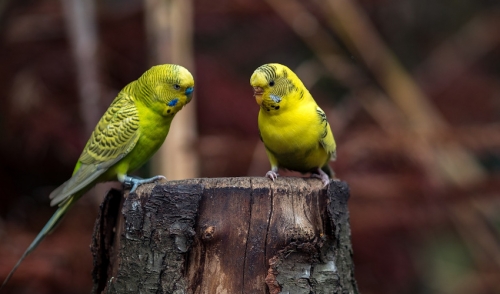
This image is property of s3.amazonaws.com.
5. Eye and Ear Troubles
5.1 Conjunctivitis
Conjunctivitis, also known as pink eye, is an inflammation of the conjunctiva, a thin membrane that covers the front surface of the eye and inner eyelids. Birds with conjunctivitis may have swollen or red eyes, discharge, squinting, or excessive blinking. Seeking veterinary care is crucial to determine the underlying cause of conjunctivitis and provide appropriate treatment, which may include antibiotics or antiviral medications.
5.2 Eye Injuries
Birds can suffer from eye injuries due to accidents, fights, or foreign objects. Eye injuries can range from minor scratches to more severe damage that can affect vision. Signs of eye injuries in birds may include redness, tearing, swelling, or cloudiness of the eye. Prompt veterinary attention is necessary to prevent complications and provide appropriate treatment, which may involve eye drops or ointments.
5.3 Cataracts
Cataracts are a common eye condition in birds, particularly in older age. They refer to the clouding of the lens inside the eye, which can lead to impaired vision or blindness if left untreated. Cataracts may develop due to aging, injury, or underlying health conditions. If you notice signs such as cloudy or opaque eyes, consult a veterinarian specialized in avian medicine to evaluate the extent of the cataracts and discuss treatment options.
5.4 Ear Infections
Ear infections can affect birds and can lead to symptoms such as head shaking, scratching at the ears, discharge, or balance problems. Infections can occur due to bacteria, fungi, or parasites. It is crucial to seek veterinary attention promptly to diagnose the specific cause of the ear infection and provide appropriate treatment, which may involve antibiotics or antifungal medications.
5.5 Tumors
Tumors can develop in the eyes or ears of birds, causing various symptoms depending on their location and size. Tumors may be benign or malignant, and they can impact vision or hearing. If you notice any abnormal growths or changes in your bird’s eyes or ears, it is essential to consult a veterinarian specialized in avian medicine to determine the nature of the tumor and discuss potential treatment options.
6. Reproductive Issues
6.1 Egg Binding
Egg binding occurs when a female bird is unable to pass an egg due to various factors, such as inadequate nesting materials, calcium deficiencies, or abnormalities with the reproductive tract. Birds with egg binding may exhibit symptoms such as straining, weakness, lethargy, or a prolonged pressing to lay an egg. Egg binding is a medical emergency, and immediate veterinary care is crucial to alleviate the bird’s discomfort and prevent potential complications.
6.2 Reproductive Tumors
Reproductive tumors can affect both male and female birds, leading to problems such as abnormal egg production or infertility. These tumors can occur in the reproductive organs, such as the ovaries or testes, and may require surgical intervention for treatment. Regular veterinary check-ups and screenings can help detect reproductive tumors early, allowing for effective treatment options.
6.3 Infertility
Infertility can occur in birds due to various factors, including nutritional deficiencies, hormonal imbalances, age, or infections. If a breeding pair fails to produce viable eggs or experiences repeated unsuccessful attempts at hatching eggs, seeking veterinary advice is important to identify the underlying cause. Your veterinarian can recommend appropriate diagnostic tests and treatment options to address infertility in birds.
6.4 Reproductive Organ Infections
Infections of the reproductive organs in birds can occur due to bacteria, fungi, or viruses. These infections can lead to symptoms such as abnormal egg production, changes in behavior, or a decline in overall health. Prompt veterinary care is important to diagnose the specific infectious agent and provide appropriate treatment, which may involve antibiotics or antifungal medications.
6.5 Behavioral Problems
Behavioral problems can also manifest as reproductive issues in birds. This may include excessive egg-laying, aggression towards mates or offspring, or nest destruction. Behavioral problems in birds can be influenced by factors such as social dynamics, cage size, or inadequate mental stimulation. Consulting a veterinarian who specializes in avian behavior can help address these issues and provide guidance on environmental enrichment and behavioral modifications.
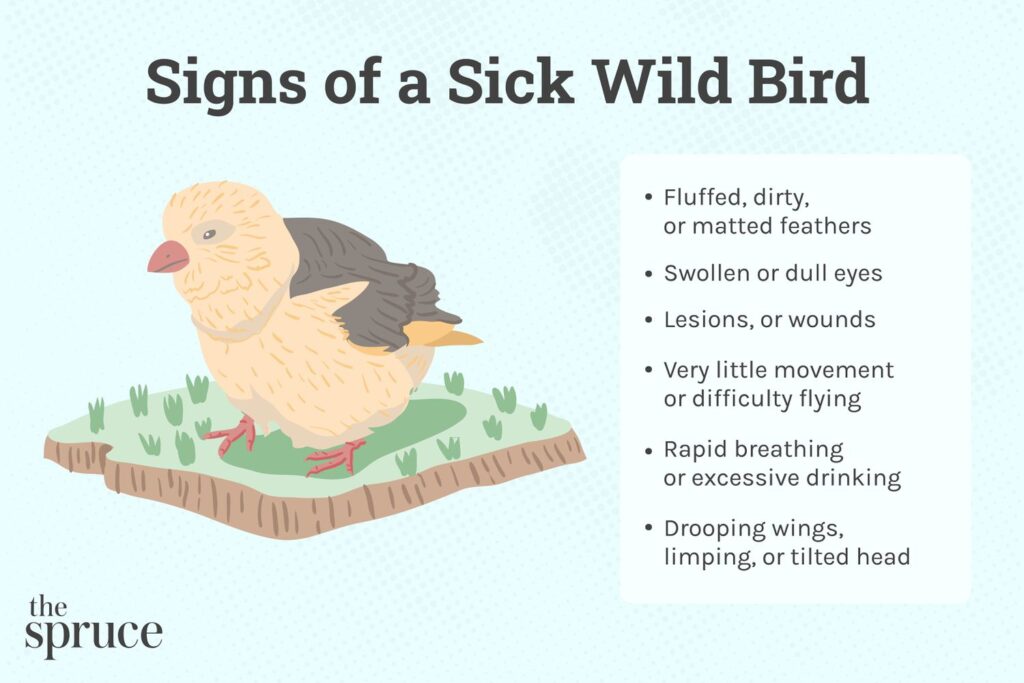
This image is property of www.thespruce.com.
7. Parasitic Infestations
7.1 External Parasites (Mites, Lice, Fleas)
Birds can suffer from various external parasites such as mites, lice, and fleas. These parasites can infest the feathers, skin, or respiratory system of birds, causing discomfort and potential health complications. Signs of external parasite infestations in birds may include feather damage, itching, irritation, or excessive preening. Veterinary care is crucial to diagnose the specific parasite and recommend appropriate treatments, such as insecticides or antiparasitic medications.
7.2 Internal Parasites (Worms)
Internal parasites or worms can affect the gastrointestinal system of birds. Common types of internal parasites in birds include roundworms and tapeworms. Infestation can lead to symptoms such as weight loss, poor growth, diarrhea, or a swollen abdomen. Veterinarians can perform fecal examinations to detect the presence of internal parasites and recommend suitable deworming treatments to eliminate the infestation.
7.3 Blood Parasites (Malaria, Babesiosis)
Birds can also be affected by blood parasites such as malaria and babesiosis. These parasites are typically transmitted through the bites of infected insects, such as mosquitoes or ticks. Blood parasite infestation can lead to symptoms such as weakness, loss of appetite, anemia, or even organ failure. Veterinarians can perform blood tests to diagnose blood parasites and prescribe appropriate treatment to address the infestation.
7.4 Protozoan Parasites (Coccidiosis, Trichomoniasis)
Protozoan parasites can affect various body systems in birds, such as the digestive or reproductive system. Common protozoan parasites in birds include coccidia and trichomonads. Infestation can lead to symptoms such as diarrhea, weight loss, poor growth, or reproductive issues. Veterinary care is crucial to diagnose the specific protozoan parasite and prescribe appropriate medications to eliminate the infestation.
7.5 External Parasite-Borne Diseases (Avian Pox, Avian Malaria)
Some external parasites, such as mites or mosquitoes, can transmit diseases to birds. Avian pox and avian malaria are examples of diseases that can be transmitted through external parasites. These diseases can lead to various symptoms, including fever, lethargy, respiratory issues, or organ failure. Consult a veterinarian who can diagnose the underlying disease and recommend appropriate treatments to address the infection.
8. Neurological Disorders
8.1 Seizures
Seizures can occur in birds due to various factors, such as genetic predisposition, head trauma, infectious diseases, or toxin exposure. Birds experiencing seizures may exhibit involuntary muscle movements, loss of coordination, or loss of consciousness. Veterinary care is crucial to determine the underlying cause of seizures and provide appropriate treatment, which may involve anticonvulsant medications or supportive care.
8.2 Head Tilt
Head tilt, also known as torticollis, refers to an abnormal positioning of the head in birds. It can occur due to various factors, including ear infections, neurological damage, or trauma. Birds with head tilt may have difficulty maintaining balance, exhibit circling behavior, or experience changes in appetite. It is important to seek veterinary attention to identify the underlying cause of head tilt and determine the most appropriate treatment options.
8.3 Ataxia
Ataxia refers to a lack of coordination or unsteady movements in birds. It can occur due to various neurological disorders, such as viral infections, trauma, or metabolic imbalances. Birds with ataxia may have difficulty perching, walking, or flying. Comprehensive veterinary evaluation is necessary to determine the underlying cause of ataxia and provide appropriate management and supportive care.
8.4 Paralysis
Paralysis can occur in birds due to various reasons, including spinal cord injuries, infections, or toxins. Paralyzed birds may lose control of their limbs or wings and may be unable to move or fly. Veterinary care is essential to diagnose the specific cause of paralysis and develop an appropriate treatment plan, which may involve supportive care, physical therapy, or surgery.
8.5 Tumors
Tumors can develop in the nervous system of birds, leading to neurological symptoms and complications. Neurological tumors in birds can present with a wide range of signs, including seizures, weakness, changes in behavior, or loss of coordination. Veterinary evaluation and diagnostics, such as imaging or biopsies, are necessary to determine the nature of the tumor and discuss potential treatment options.
This image is property of vcahospitals.com.
9. Traumatic Injuries
9.1 Broken Wings or Legs
Birds can experience broken wings or legs due to accidents, falls, or collisions. Broken bones can cause pain, swelling, or deformities in the affected limb. It is important to handle injured birds with care and seek veterinary attention promptly to assess the extent of the injury and determine appropriate treatment options, which may involve splinting, casting, or surgical repair.
9.2 Lacerations and Abrasions
Lacerations and abrasions can occur in birds due to encounters with sharp objects, predators, or aggressive behavior. Open wounds on the skin can lead to bleeding, pain, or risk of infection. Seeking veterinary attention is crucial to clean and assess the wound, and provide appropriate treatment, which may include suturing, wound care, or antibiotics to prevent infection.
9.3 Avian Attacks
Avian attacks can happen when birds are housed together and engage in aggressive behavior. These attacks can lead to various injuries, including bite wounds, scratches, or feather damage. It is important to separate birds involved in avian attacks and provide appropriate medical care to address any injuries sustained during the altercation.
9.4 Falling or Impact Injuries
Birds that are allowed out of their cages or enclosures may be at risk of falling or experiencing impact injuries. These injuries can occur due to collisions with objects or structures or falling from great heights. Falling or impact injuries can lead to fractures, internal injuries, or trauma. Veterinary care is crucial to evaluate the extent of the injuries and provide appropriate treatment or supportive care.
9.5 Beak and Talon Injuries
Birds’ beaks and talons can be prone to injuries, such as fractures, breaks, or tears. These injuries can occur due to accidents or aggressive behavior. Beak and talon injuries can hamper a bird’s ability to eat, perch, or defend itself. Timely veterinary attention is necessary to assess the injuries and determine suitable treatment options, which may involve filing, bonding, or surgical repair.
10. Metabolic Disorders
10.1 Liver Disease
Liver disease can occur in birds due to various factors, such as viral infections, toxins, or nutritional imbalances. Birds with liver disease may exhibit symptoms such as jaundice, weight loss, poor appetite, or changes in droppings. Veterinary care is crucial to diagnose the specific cause of liver disease and provide appropriate treatment options, which may involve supportive care, dietary adjustments, or medication.
10.2 Kidney Disease
Kidney disease refers to the malfunctioning or failure of the kidneys to filter waste products from the blood. Birds with kidney disease may show symptoms such as increased drinking and urination, weight loss, or changes in behavior. Veterinary evaluation, including blood and urine tests, is important to diagnose kidney disease and determine appropriate treatment options, which may include fluid therapy, dietary changes, or medications.
10.3 Gout
Gout is a metabolic disorder that can affect birds, particularly those with a diet high in protein. It occurs when there is an accumulation of uric acid crystals in the joints or organs, leading to joint pain, swelling, or organ damage. Veterinary care is crucial to diagnose gout and recommend appropriate treatment options, which may involve dietary adjustments and medications.
10.4 Diabetes
Diabetes can occur in birds and affects the body’s ability to regulate blood sugar levels. This metabolic disorder can lead to symptoms such as increased thirst, excessive urination, weight loss, or changes in behavior. Consult a veterinarian who can perform diagnostic tests to confirm diabetes and recommend appropriate management strategies, which may involve dietary adjustments, medications, or insulin therapy.
10.5 Hypothyroidism
Hypothyroidism occurs when the thyroid gland fails to produce adequate levels of thyroid hormones. Birds with hypothyroidism may show symptoms such as weight gain, fatigue, changes in feather quality, or changes in behavior. Veterinary evaluation is crucial to diagnose hypothyroidism and recommend appropriate treatment options, such as hormone replacement therapy, dietary adjustments, or supplementation.
In order to provide the best care for your bird, it is important to understand the various health issues that they may encounter. By recognizing the symptoms and seeking veterinary treatment promptly, you can help ensure that your feathered friend receives the appropriate care and treatment necessary to address any health concerns. Remember, prevention is always key, so providing a balanced diet, maintaining proper hygiene, and ensuring a safe and enriched environment can go a long way in promoting the overall health and well-being of your avian companion.


